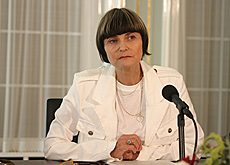
Swiss step up humanitarian aid for Lebanon

Switzerland is to contribute a further SFr5 million ($4 million) in humanitarian aid as a result of the ongoing crisis in Lebanon.
The government on Wednesday decided that the money would go to the Swiss-led International Committee of the Red Cross for its emergency activities.
Foreign Minister Micheline Calmy-Rey said a special cabinet session on the Lebanon crisis had supported the current policy of the foreign ministry but had not decided on any other measures.
“Switzerland is limiting itself to a humanitarian perspective and is going to continue in that direction.”
She told a news conference that further financial contributions would depend on reports from the 30 Swiss specialists who are now on the spot.
Switzerland is currently building a camp for displaced persons in Lebanon and has sent 800 kg of medicines and seven tons of relief goods.
The government was wary about whether Switzerland should consider the conflict as a war between two countries.
Neutrality
If it were to take this view, Switzerland would then be in a position to have recourse to the law on neutrality, which forbids military support to warring parties.
Calmy-Rey said the cabinet had left this question open for the time being because recourse to the law would in practice have no great effects.
She added Switzerland was exporting no war material to the parties involved and this would remain the case.
The government abstained from explicitly criticising the Israeli attacks as “disproportionate” as Calmy-Rey had done a week ago.
Calmy-Rey said it was too early to discuss the possibility of sending Swiss troops to join any international peacekeeping mission to Lebanon.
“Information is still much too vague to discuss the issue and take a position.”
And she said the sending of Swiss troops to protect Switzerland’s embassy in Beirut made little sense for the time being.
Evacuees
Calmy-Rey also gave an update on the number of people Switzerland has evacuated since the beginning of the crisis.
She said the foreign ministry had helped 875 people leave the country – 795 Swiss and 80 foreigners living in Switzerland. A further 215 Swiss did not wish to leave.
She added that the government remained concerned about the situation of Swiss living in southern Lebanon, which remains blocked because of military operations.
There was still no news about three Swiss who were in the region.
The political parties represented in the government for the most part backed Wednesday’s decisions. However, the centre-left Social Democratic Party – the party of Calmy-Rey – said the approach was too passive.
Displaced persons
In Lebanon itself, the head of Switzerland’s Humanitarian Aid Unit, Toni Frisch, says the main problem facing local authorities is the high number of Internally Displaced Persons (IDPs).
“There are hundreds of thousands of people who need shelter, water as well as medical assistance and care. That is a tremendous challenge for the [Lebanese] government. One in four people is displaced,” he told swissinfo.
Swiss specialists on the spot have been helping the repatriation of Swiss nationals and assessing medical, logistics, water, sanitation and shelter requirements.
“We have been working very closely with the authorities and the outcome is that we will focus on medical and shelter issues.”
Frisch said people were afraid the situation would worsen and more IDPs were expected.
“These displaced people cannot access hospitals… and they are being sheltered in public buildings. Many of them have lost everything as they had to leave all their personal belongings behind. This is the biggest problem for the government.”
He also said that sending aid in the field was difficult because truck drivers were refusing to drive, fearing being bombed or shelled.
“They won’t even go for a high price and this is a real problem,” Frisch noted.
swissinfo with agencies
The government has now unblocked a total of SFr6.5 million for emergency aid of the Geneva-based ICRC.
The foreign ministry has helped 875 people leave Lebanon – 795 Swiss and 80 foreigners with residence in Switzerland.
The evacuation programme has so far cost SFr2.5 million.
The main political parties in Switzerland have welcomed Switzerland’s humanitarian commitment but opinions differ at the political level.
The centre-left Social Democrats criticised the “passivity” of the government, which should have condemned the violation of peoples’ rights and immediately ceased military cooperation with Israel.
The Green Party was “very disappointed” with the government’s restraint. It also called for the halt to any military cooperation.
But the rightwing Swiss People’s Party welcomed this restraint. The party also said it was positive that Switzerland did not have to send troops to protect its embassy.
The centre right Radicals and Christian Democrats believed the government position was “realistic”.

In compliance with the JTI standards
More: SWI swissinfo.ch certified by the Journalism Trust Initiative




























You can find an overview of ongoing debates with our journalists here . Please join us!
If you want to start a conversation about a topic raised in this article or want to report factual errors, email us at english@swissinfo.ch.